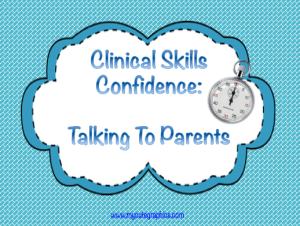Clinical Skills Confidence: Talking To Parents
I have decided to start a new section of my blog called Clinical Skills Confidence. I have been out in the “working SLP world” for almost 3 years. I have learned SO much in the past few years and it’s been a rollercoaster of feelings. There are some areas that I feel a bit more confident in, as well as some areas that I know I need more experience with.
I have not forgotten that feeling of “I don’t know what to do with this.”
Each time I post under this section, I’ll be discussing a topic that I’m sure someone out there can relate to. It might be an area that I feel more confidence in or it might be one that I’d like to learn more about. As SLPs, our field covers such a broad range of topics. I’m pretty sure you’d have to be super-human to be an expert in EVERYTHING. Join me on this journey!
First up: talking to parents! Fresh out of grad school, I walked into the schools and was suddenly faced with IEP meetings, which meant talking to parents. There was no class in grad school that taught how to do this. Sometimes at meetings, I was reporting scores and telling parents that their child needed speech therapy. It’s definitely a little scary the first few times. These are the tips that I learned in my CF:
1. Write up an outline: It helped me to have all my information written down together. If it was an initial meeting where we were reporting results and discussing the need for therapy, I printed out a copy of my report and highlighted important areas that I wanted to talk about (scores, what they meant, etc).
2. Let them ask questions: I usually always ended by asking if the parents had any questions. I would generally always provide my email or phone number, so they could contact me later on when and if they thought of questions.
3. Keep the jargon to a minimum: “Johnny demonstrates fronting errors, which means he produces alveolar sounds instead of velar sounds. This negatively impacts his intelligibility.” Excuse me, what?! While I would use the “technical terms,” I would then also describe things in terms that were easier to understand. “Instead of producing the ‘k’ sound, Johnny produces the ‘t’ sound, so ‘cat’ sounds like ‘tat.'”
4. Provide handouts: Super Duper has tons of great handouts that can be given to parents to provide additional information.
5. Slow down: I tend to talk quickly, especially if I’m nervous. So I have to constantly remind myself to SLOW DOWN. Sometimes I would even draw a little squiggly line on my paper, which reminded me to slow down.
2. Let them ask questions: I usually always ended by asking if the parents had any questions. I would generally always provide my email or phone number, so they could contact me later on when and if they thought of questions.
3. Keep the jargon to a minimum: “Johnny demonstrates fronting errors, which means he produces alveolar sounds instead of velar sounds. This negatively impacts his intelligibility.” Excuse me, what?! While I would use the “technical terms,” I would then also describe things in terms that were easier to understand. “Instead of producing the ‘k’ sound, Johnny produces the ‘t’ sound, so ‘cat’ sounds like ‘tat.'”
4. Provide handouts: Super Duper has tons of great handouts that can be given to parents to provide additional information.
5. Slow down: I tend to talk quickly, especially if I’m nervous. So I have to constantly remind myself to SLOW DOWN. Sometimes I would even draw a little squiggly line on my paper, which reminded me to slow down.
Hope this was informative! What are your tips for talking to parents?


One tip I learned a few years ago is that it’s not always the parents who don’t understand terms. Instead of asking parents if they understand or have questions, I open it up to the whole team. That way, the parents don’t feel like they’re the only ones who don’t know what’s going on, and if school personnel ask questions, it’s okay for them to. I’ve also asked teachers to clarify. Fortunately, I have a wonderful principal who listens to everything, clarifies, and then summarizes for the whole team, and she’s able to include parent, teacher and SLP viewpoints.
Oh, How Pintearesting!
Good point Laura!
I believe that public relations is 90 percent of the job! I always ask parents what their concerns are, and after I give my information, I ask if there is anything they think I’ve missed. In my over 35 years teaching, it’s all good!
Public relations is 90 percent of the job!! I always earn trust by asking parents if they think I’ve missed anything. I also empower them by telling them how important they are to their child’s therapy success. In my over 35 years teaching, it’s been all good!